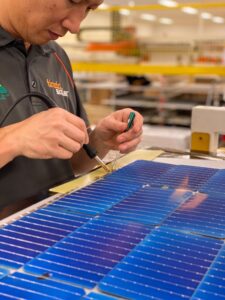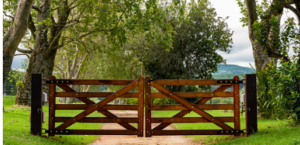Month: August 2023
Australian-Made Solar Panels
August 7, 2023
Twenty years ago Australia boasted an advancing solar manufacturing sector; however, that was short-lived. Nowadays China accounts for 70% of world production while Australian companies struggle to remain relevant in an increasingly global marketplace.
Australian made solar panels manufactures their panels locally in Mawson Lakes, South Australia using premium-quality components from reputable global suppliers like Q-cell solar cells, Dupont back sheets, Dow Corning edge seals and Bridgestone EVAsky encapsulants – offering 25 year product warranties on each module made for life!
Tindo Solar
 Tindo Solar is Australia’s first and only manufacturer of high quality solar panels, designed specifically to withstand Australian conditions and produced using highly automated production facilities that maximise reliability and efficiency. Headquartered in Adelaide and with installations throughout Australia – their name comes from Kaurna Warra meaning ‘Sun”- Tindo was established as an Australian brand in 2011.
Tindo Solar is Australia’s first and only manufacturer of high quality solar panels, designed specifically to withstand Australian conditions and produced using highly automated production facilities that maximise reliability and efficiency. Headquartered in Adelaide and with installations throughout Australia – their name comes from Kaurna Warra meaning ‘Sun”- Tindo was established as an Australian brand in 2011.
Tindo stands out in an ever-evolving solar market where new brands seem to emerge all the time (most originating in China), offering consumers assurance of its product. Tindo emerged just years after one domestic manufacturer, BP solar, had closed down. Tindo founder Adrian Ferraretto had previously worked for Solar Shop – Australia’s largest residential installer that collapsed due to government cuts affecting solar industry operations.
Tindo Solar currently manufactures 150MW annually using advanced manufacturing techniques and has established the Australian Centre for Excellence in PV (ACEPV), an innovation and research centre which will enhance Australia’s domestic solar manufacturing capability.
Recently, they introduced a 410W Karra panel designed specifically to serve utility-scale customers within Australia’s solar market. According to an evaluation performed by TUV SUD Korea, it produced 5 watts more power than advertised with only 0.07% cell-to-module loss – significantly lower than industry norms of 2-3% CTM loss.
Canadian Solar
Canadian Solar is an industry-leading supplier of Australian made solar panels high-efficiency and long-life solar panels. Their diverse product offerings span from residential, commercial and utility scale modules for power generation systems. Furthermore, they have a team dedicated to designing, building and operating large-scale solar farms worldwide.
Canadian Solar’s products are produced in China, Canada, and the US. Their main office in Cremorne Melbourne serves as a showroom/warehouse facility; three additional sites across Australia also exist as warehouses. Canadian Solar also maintains an expansive network of partners to assist with installation services.
HiKu and HiKu7 panels from Suniva offer some of the highest performance lower cost panels available today, boasting both polycrystalline and monocrystalline varieties with cutting-edge PV cell innovations such as dual cell technology. Both models provide efficient lower cost solar panel solutions.
HiKu7 bifacial model stands out in terms of performance for its exceptional 670W power output with up to 21.6% efficiency. Furthermore, this panel is less prone to hot spots and microcracks – making it suitable for multiple applications.
This company conducts rigorous audits on its supply chains to ensure materials used do not contain any banned materials, such as minerals mined using forced labor (slave labor). Furthermore, all of their products are produced by workers who receive fair wages and are treated with dignity during production.
Trina Solar
Trina Solar is one of the world’s leading producers of solar panels. They specialise in commercial and residential applications using various cell technologies such as multi-busbar PERC cells or large 210mm third-cut monocrystalline cells – earning them a reputation for quality with an extensive network of distributors across Australia.
Trina Solar has experienced some issues with some of their older panels due to backsheet degradation and moisture ingress (PID). These issues were most frequently found with its Honey series panels which have since been upgraded with mono-crystalline construction featuring black backsheets for an all-black aesthetic and improved efficiency thanks to new half-cut PERC cells incorporating 9 busbars compared with its predecessor ranges. Trina has taken action by replacing this series with its newly introduced Honey M range featuring monocrystalline cells built using 9 busbar technology for better efficiency as well.
Australian made solar panels come backed with both a 12-year product and 25-year performance warranties, and have earned Tier 1 status from PVEL, one of the world’s premier independent PV testing services.
Trina Solar stands out as an innovator in the solar energy industry, having recently reduced water and electricity usage at their manufacturing plants by 32% and 47%, respectively – an impressive achievement that demonstrates their dedication to sustainability.
Sunpower
Solar panel manufacturers rely on imported components to construct their modules, with Australia’s only commercial-scale manufacturer being Tindo Solar of Adelaide who import all the raw materials required and then build each module themselves in their factory. At present, Tindo produces 190-200W panels specifically engineered and designed to operate under Australia’s difficult climate. They also have an excellent warranty policy.
Tindo Karra solar modules use monocrystalline silicon cells equipped with PERC technology developed at UNSW to produce highly efficient modules. This technology reduces bus bar spacing for improved energy yields and reduced internal resistance losses; giving homeowners excellent value for their investment. The Tindo Karra panels offer excellent value to homeowners.
Karra modules may not be inexpensive, but they provide a rewarding way to invest in solar while supporting an Australian company. Karra offers both 5-year power and 25-year linear performance warranties to protect you when purchasing their products.
Twenty years ago Australia appeared poised to become a global player in solar manufacturing through an expanding manufacturing sector. Unfortunately, China quickly took over, taking over roughly 70% of global production today while Australian production only accounts for 0.3%. Now with global supply shortages emerging out of China’s factories, can local manufacturing provide lucrative opportunities and long-term solutions?
Rural Farm Gates
August 3, 2023
Rural farm gates are used to divide paddocks and livestock yards. In being effective, these gates must be sturdy enough to prevent animals from pushing through too easily.
They’re simple in design, functional and require little upkeep or maintenance – simply hanging with j-bolt hinges screwed into wooden or metal posts is sufficient.
Material
 Farm gates come in all forms imaginable, from simple, practical designs to more decorative options. But all serve the same purpose – protecting animals while barring outsiders. Most are constructed using durable materials like steel and aluminium, which withstand severe weather conditions well.
Farm gates come in all forms imaginable, from simple, practical designs to more decorative options. But all serve the same purpose – protecting animals while barring outsiders. Most are constructed using durable materials like steel and aluminium, which withstand severe weather conditions well.
Your choice of the rural farm gates Adelaide will depend on the size and behaviour of your livestock. For example, large animals like cattle require wider gates than smaller ones to prevent escapees from passing through. Furthermore, it should be strong enough to withstand weighty farm equipment without dissolving.
Steel gate styles are popular because they are durable and affordable, and fully customizable in size and design. You can add features such as latches to secure the gate in its place. Electric gates may also be helpful, especially on farms that receive abundant traffic – these gates can even open/close remotely – making these ideal solutions.
Tubular farm gates feature metal tubing welded together into various patterns such as coiling or asymmetry, providing lighter-weight gates that can easily be moved from location to location without needing posts – perfect for openings that don’t give enough room for swing gates.
Design
Assisting livestock keepers with keeping livestock contained and out of pastures, training grounds, or corrals quickly requires the appropriate gate. Not only will it stop them wandering off-property, but it can also increase curb appeal and add value. Residential homeowners also appreciate having attractive gates installed to add curb appeal and increase property values.
Your rural farm gates Adelaide can come in single or double-width options; the latter consists of two single gates meeting in the middle for ease of opening and closing, making this ideal for covering larger spans while remaining easy to open/close compared to single-wide gates. Furthermore, double gate configurations require less pressure on supporting posts while suitable for wood or metal fencing systems.
Installation
Metal agricultural gates from various manufacturers come in all styles and varieties, from welded tube styles to ones featuring wire mesh infill. The latter allows the gate to be built using fewer horizontal rails for easier assembly; such gates are especially beneficial in keeping smaller animals and livestock secure within fences constructed using either woven wire or welded wire mesh fencing systems.
If your gate will be installed on an inclined surface, adding strainer wire lengths on both sides is wise. Strainer wire balances out the pressure exerted from its downward pressure against that exerted from an outward pulling fenceline and ensures your gate remains in its place and does not move downhill.
Maintenance
Faulty gates and fences can lead to the death of livestock or injury for those handling them, so they must be safe and well-maintained to ensure the well-being of livestock and people working around them. Gate latches should be sturdy yet easy to open/close, while all laneways should be clear of obstructions such as puddles or debris that could trip someone up. At the same time, yard crates, crushes, and pens should provide comfortable space for animals while having strong footholds to support them.
Metal gates are essential for any farm, yet they require proper upkeep to perform efficiently. Lubricating them regularly will help the gate move more efficiently with reduced friction, allowing it to remain rust-free for extended use. In addition, regular inspections should be performed to detect signs of wear or damage to ensure maximum performance during winter’s harsh climate conditions.
Cattle gates are used when there are openings in your fence that you don’t want livestock accessing but still need equipment. Cattle gates can help prevent cattle from escaping their pasture while making access easy for vehicles and equipment. When placed strategically, they are an effective method of keeping out livestock. Ideally placed at one corner of a pasture and easily accessible by vehicles driving through them – an effective and accessible combination!